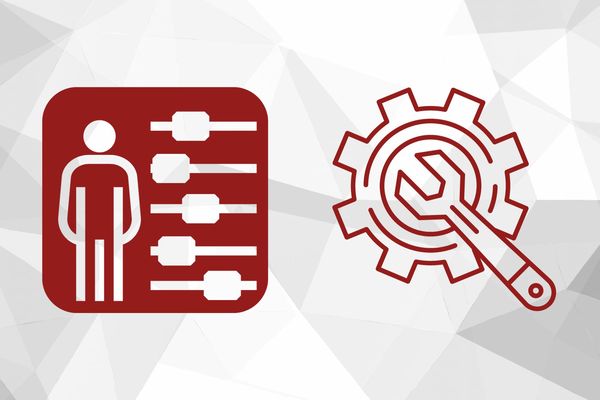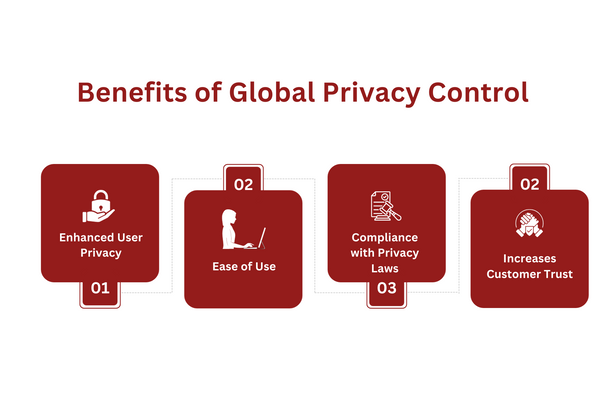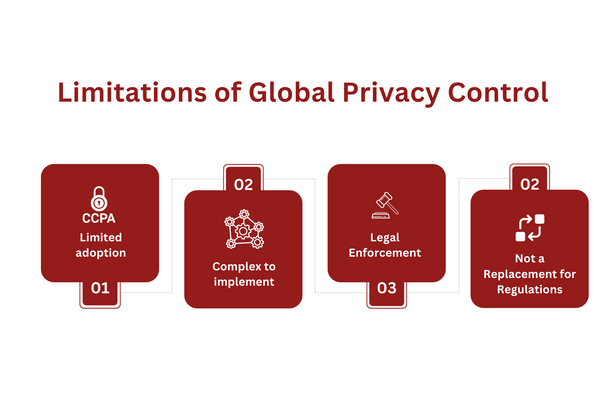
If you’ve been online, you’ve probably seen the term GPC and wondered what it means. GPC stands for Global Privacy Control.
In this article, we will learn all about what it is, how it works, why it’s important, and how global privacy even works.
Captain Compliance has created a Chrome plugin for Global Privacy Control to confirm if it’s working. Download our privacy software today for free in the Google Chrome store: 
Key Takeaways
GPC is dedicated to improving the privacy of online users by automatically sending a signal to websites being visited and communicating users’ privacy preferences.
The GPC initiative allows users the freedom to control their personal data and how and when their personal details get to be used by any advertiser or online business.
Regulations in California, like the California Privacy Rights Act, allow for penalties to be imposed on businesses that do not comply with both the CCPA and GPC regulations.
What is Global Privacy Control?

Global Privacy Control (GPC) gives internet users the option to control what is done with their personal information and their privacy preferences. The GPC will allow the user to select their personal privacy preferences, and websites will need to follow them.
After you decide what information the website can use, the GPC will inform the website via a Global Privacy Control signal so they can handle your preferences accordingly.
GPC was created as a way to optimize user experience while visiting different websites and provide privacy controls. Before the Global privacy signal, if users wanted to opt out of having their personal information collected from a website, they would have to do this manually at each website.
Now, with GPC options for certain browsers, users set their preferences for all websites using the web browser settings, which means it uses your preferences automatically without needing to change them within each website.
GPC was also created to help consumers exercise their right to privacy by disabling third-party tracking and illegally selling and sharing consumers’ data without their permission. This helps build up trust between the website and the users as they know their information is safe.
The GPC was also designed to support existing privacy legislation in the US to protect consumers’ rights and ensure that businesses are following regulatory guidelines such as those set out by the California Consumer Protection Act (CCPA).
For example, the CCPA will investigate where GPC picks up a conflicting signal when a consumer visits the website. It will also notify the business of the conflict and give the user a privacy notice and an opportunity to confirm their settings.
Global Privacy Control (GPC) So Far This Year: A Quick Brief
- Regulatory Recognition – GPC is now explicitly recognized as a valid opt-out mechanism under laws like the California Consumer Privacy Act (CCPA/CPRA), Colorado Privacy Act (CPA), and Virginia Consumer Data Protection Act (VCDPA). Businesses must respect GPC signals to avoid compliance violations.
- Wider Browser & Platform Support – More mainstream browsers (Chrome, Firefox, Edge, Safari) and privacy-focused extensions have integrated GPC as a default feature, making it easier for users to activate.
- Enforcement Actions – Regulators, especially in California, have begun enforcing penalties against companies that fail to honor GPC signals.
- International Interest – While primarily recognized in the U.S., discussions continue about incorporating GPC into global privacy frameworks like the GDPR, potentially influencing EU and UK regulations.
For businesses, ensuring compliance with GPC is now a critical component of a robust consent management strategy, making preference management platforms like Captain Compliance more important than ever.
How Does Global Privacy Control Work?
Simply put, the GPC is a technical specification for a browser setting or enabled extension that notifies websites of the user’s privacy preferences by transmitting universal opt-out signals using binary options to allow website visitors to opt out of sharing personal information at the browser level.
To exercise their right to opt out of any sharing and sale of their personal data, users need to only set up the GPC setting or extension once.
The GPC then subsequently communicates those preferences every time a user is asked for their consent. The GPC setting allows for automatically communicated responses to the likes of opt-in or opt-out choices regarding cookie use, data sharing or sale of personal data, or targeted advertising.
These preferences can be as simple as disallowing all access to the user’s personal data or more specific requests by communicating permission for some uses and refusing other user data collection and usage.
Data security is important for private users and especially for business users, where websites with malicious intent can track sensitive, confidential information. Those serious about data protection should consider using dedicated GPC-native browsers like Firefox, Brave, and DuckDuckGo, which all support GPC.
Private and commercial users must bear in mind that not all consumer or corporate business websites are GPC compliant and, thus, should ensure that whatever browser they use can block requests from these sites.
How is Global Privacy Control Different from Do Not Track?
The GPC initiative differs from Do Not Track (DNT) as the GPC has become, in some cases, a legally enforceable and more standardized, more complete communication signal, allowing online users to communicate their privacy preferences compared to DNT. If you see a Do Not Track section of a privacy policy it means they are outdated and have not updated it in a while.
DNT, as an earlier development, lacked any uniform legal enforcement, with many websites refusing to honor the DNT requests.
GPC, however, from the outset, was designed to comply with existing privacy laws and assist businesses in meeting their legal requirements as set by privacy regulations, including the California Consumer Protection Act (CCPA), where businesses are required to respect the GPC signal in California, where the data privacy laws include the requirement.
In the GPC proposal, the text outlines how the GPC signal will also be used to communicate the “Do Not Sell” requests to comply with the CCPA.
Another key difference is the wider recognition of GPC by advertisers and publishers alike. First seen in 2009, DNT suffered from the lack of support as no agreement was ever reached in finding a standard solution to respond to a browser’s do not track signal. This lack of a solution was not beneficial to advertisers or publishers.
How is Global Privacy Control Different from Consent Management Platforms?
The GPC and Consent Management Platforms (CMP) must comply with any applicable data protection laws. However, they have distinct purposes. CMP assists businesses in collecting personal data only after receiving explicit consent from the user.
Internationally, laws like the European General Data Protection Regulation, China’s PIPL, and the Brazilian General Data Protection Law require businesses to obtain explicit user consent before data collection.
The CMP assists publishers in honoring customers’ requests with built-in functionalities that make it easier for businesses to request data, obtain the data, and withdraw any consent previously given.
With the implementation of a GPC and a CMP, online businesses will ensure compliance with data protection regulations to avoid legal challenges and be able to prioritize their user’s privacy, building trust with visitors to their websites.
Benefits of Global Privacy Control

The GPC, as initiated by the 50-plus organizations hosting tens of thousands of websites, set out to find a simplified and universal way to make it easy for the estimated 4.66 billion internet users to enhance their data privacy.
Enhanced User Privacy
With so many users online, GPC allows users to browse their favorite sites confidently, knowing that their personal privacy is automatically guaranteed.
Ease of Use
The GPC allows internet users the convenient solution of implementing a browser setting once only without the need to click on any pop-ups every time a new website is visited. This is of particular importance for business users where operational efficiency is key.
Compliance with Privacy Laws
Using the GPC will help businesses avoid the associated costs and inconveniences of legal actions by complying with all regulatory privacy laws like the CCPA.
Businesses should ensure that consumers are given a no-hassle and easy option to opt out of the collection and processing of their personal information to help them remain in compliance with privacy laws.
Increases Customer Trust
Commercial websites are the online face of any business. Building trust with visitors is essential to both encourage online traffic and retain visitors to the website.
This makes your company’s websites and apps GPC compatible and will lead to transparency and building trust, promoting growth.
Limitations of Global Privacy Control

As mentioned, the State of California is the only US state enforcing the GPC with its privacy laws, with Colorado and Connecticut following suit in 2024 and 2025, respectively, with the Connecticut Data Privacy Act and Colorado Privacy Act. This effectively limits the implementation of GPC to users based only in California.
Limited adoption
The largest browsers, such as market leaders Google Chrome, with a share of internet users close to 64%, and Apple’s Safari, at 19.85% market share, not supporting the GPC as anticipated, equates to a low 16% of the internet users that are not being offered the benefits of GPC.
Complex to implement
For any business, the implementation of GPC is not as simple as pushing a button. GPC needs to work with any compliance strategies in place to differentiate between selling or sharing data collection and usage and to ultimately link to the GPC signal.
Legal Enforcement
With only the CCPA regulations requiring legal compliance with the GPC, currently, businesses need only be concerned with Californian customers’ data collection and privacy settings.
Not a replacement for privacy regulations
The GPC is merely a mechanism that makes it easy for an online user to opt out when visiting a website. The GPC does not replace any privacy regulations.
How Can Users Implement Global Privacy Control?
By using compatible browsers, users can enable settings or extensions to implement GPC.
A number of compatible browsers support GPC, such as:
Mozilla Firefox
Mozilla was one of the early supporters of the CCPA and, in 2020, became one of the founding members of the GPC.
Duck Duck Go
DuckDuckGo uses GPC as a default setting in their mobile apps on iOS/Android and on desktop extensions, helping users keep their privacy.
Privacy Badger
The extension Privacy Badger, prevents advertisers and other third-party trackers from secretly tracking users.
Badger disallows any “third party” scripts or images that may seem to be tracking a user despite the user having denied consent by sending the appropriate DNT and GPC signals.
What Happens if You Don’t Comply with CCPA’s GPC Regulations?
The bottom line is that if your online business is not compliant with the CCPA and GPC regulations, you may be the recipient of a CCPA fine.
If the CCPA made effective in January 2020 applies to your online business, any violation of the law will result in enforcement action by the California Attorney General along with the applicable fine.
Fines have an upper cap of $7,500 per intentional violation and $2,500 per non-intentional violation. These may appear to be small penalties, but it will be in a business’s best interest to remember these penalties are for just a single consumer. Violate the trust of a few thousand consumers, and it adds up rather quickly.
Not only are penalties possible from the Attorney General, but consumers have the private right of action for these data breach violations that can also lead to civil penalties.
If found in violation, the Attorney General will give the business a 30-day remedy period to bring their procedures into compliance. If remedial action is not satisfactory after this period, penalties are imposed.
How To Implement Global Privacy Control on My Website?
The buying and selling of information is big business not only in the US but globally. Advertisers and online commerce make good use of personal data to target prospective customers and grow their interests. However, not everybody is happy to share their details.
The GPC initiative was implemented to be on the side of the consumer, helping users to automatically protect their personal data simply by using the right setting on their browser of choice.
So, if you’re a business and you’re wondering what the next steps are – it’s action. If the CCPA applies to you, you need to follow its guidelines and the software engineers here at Captain Compliance can help install a consent banner on your website for free if you’d like to get compliant.
That’s where we come in. Captain Compliance has centuries of collective experience to help you navigate privacy regulations properly. Get in touch today!
FAQs
How do I turn on global privacy control?
The best way to have GPC on your browser is to use a browser that has a GPC signal built in, such as Firefox, Brave, or DuckDuckGo.
Learn more about privacy regulations at our education page.
Does Chrome have global privacy control?
No, users can, however, download a GPC extension such as Privacy Badger or our very own Captain Compliance extension to enable GPC.
Does Californian data regulations apply to you? Find out here.
How do you test global privacy control?
Enabling a GPC signal in a compatible browser and visiting supported websites will help verify whether those websites are respecting your privacy preferences.
Here’s our complete guide to implementing cookie consent on your website.
Can an American online business be fined for non-compliance with GPC?
If the online visitor happens to be in California, your business is under the scope of California law, and their personal data is collected without their express consent, then yes, a fine is possible.